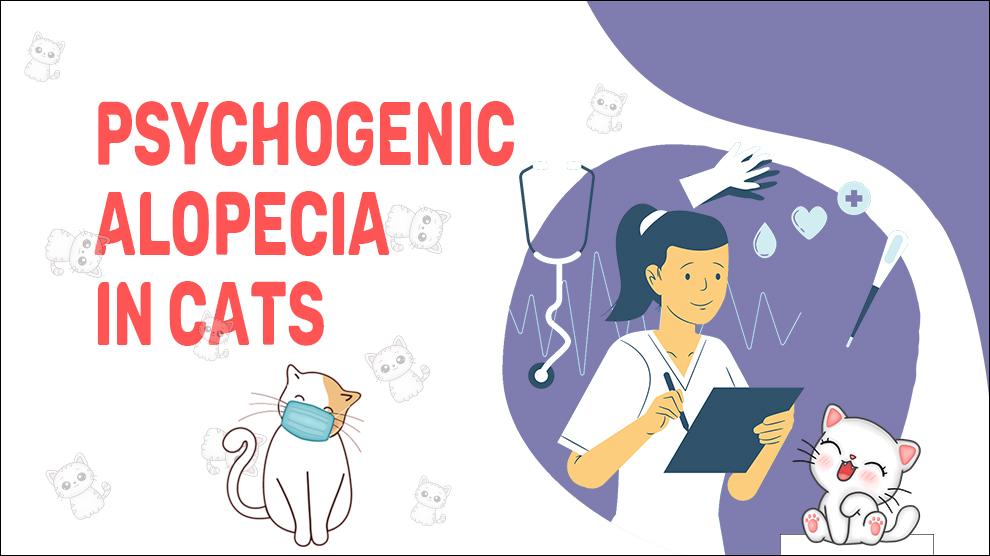What Is Psychogenic Alopecia In Cats?
Psychogenic Alopecia is a condition that affects cats. It is a type of hair loss that is caused by excessive grooming or licking of the fur.
The condition is usually caused by psychological factors such as anxiety, stress, or boredom.
Clinical Signs Of Psychogenic Alopecia In Cats
The main symptom of psychogenic alopecia in cats is excessive grooming or over-grooming, resulting in hair loss.
Cats with this condition may excessively lick, bite, or scratch their fur, often in a specific area of the body, such as the lower back, belly, or inner thighs.
Over time, this behavior can lead to patchy or complete hair loss in the affected area.
In addition to hair loss, cats with psychogenic alopecia may also exhibit other behavioral changes, such as increased anxiety, restlessness, or aggression. They may also have changes in their appetite or elimination habits.
It is important to note that hair loss in cats can also be a symptom of other underlying medical conditions, such as skin infections, parasitic infestations, or allergies.
Therefore, it is important to consult with your veterinarian to determine the underlying cause of your cat's hair loss.
- Rashes
- Redness In Skin
- Scabby Skin
- Irritable
- Hair Loss In Belly
Treatment Options For Psychogenic Alopecia In Cats
Treatment options for Psychogenic Alopecia depend on the underlying cause of the condition. Addressing the psychological factors that contribute to excessive grooming is the first step in treatment.
This may involve providing environmental enrichment for the cat, such as toys, scratching posts, or interactive play sessions.
Behavioral modification techniques, such as redirecting the cat's attention when they start grooming excessively, may also be helpful.
In some cases, medication may be prescribed to help reduce anxiety or stress levels in the cat. Antidepressants or anti-anxiety medication may be prescribed, although these should only be used under the supervision of a veterinarian.
Medications that reduce the urge to groom, such as benzodiazepines, may also be prescribed.
Home Remedies For Psychogenic Alopecia In Cats
There are several home remedies that can be used to help manage Psychogenic Alopecia in cats. One effective home remedy is to provide the cat with a comfortable, safe space to relax and destress.
This can be achieved by providing a cozy bed in a quiet room away from noisy or stressful environments.
Another home remedy is to provide the cat with plenty of opportunities for exercise and play. Interactive toys such as laser pointers, feather wands, or puzzle feeders can help to provide mental and physical stimulation for the cat.
Regular play sessions can also help to reduce anxiety and stress levels in the cat.
How To Prevent Psychogenic Alopecia In Cats?
Preventing Psychogenic Alopecia in cats involves providing them with a stimulating and enriching environment.
This can include providing them with plenty of opportunities for exercise and play, as well as providing a comfortable and safe space for them to relax and destress.
It is also important to monitor your cat's behavior and grooming habits and to seek veterinary care if you notice any sudden changes in their behavior or health.
Early detection and treatment of underlying medical conditions can help to prevent the development of Psychogenic Alopecia.
Affected Cat Breeds Of Psychogenic Alopecia
Psychogenic alopecia can affect any breed of cat, but it is most commonly seen in Siamese and other Oriental breeds.
Causes For Psychogenic Alopecia In Cats
Causes:
Psychogenic Alopecia is caused by psychological factors such as anxiety, stress, or boredom. Cats may groom excessively as a coping mechanism for stress or anxiety.
Boredom can also be a contributing factor, as cats may engage in excessive grooming when they have nothing else to do.
The condition is more common in indoor cats, as they may not have enough stimulation or opportunities for exercise.
In some cases, medical conditions such as allergies, infections, or hormonal imbalances can contribute to the development of Psychogenic Alopecia.
It is important to rule out these underlying medical conditions before diagnosing Psychogenic Alopecia.
When To See A Vet For Psychogenic Alopecia In Cats?
If you notice your cat excessively grooming or exhibiting signs of hair loss, it is important to schedule an appointment with your veterinarian.
They can perform a physical exam and diagnostic tests to determine if your cat has psychogenic alopecia or if there is an underlying medical condition causing hair loss.
Food Suggestions For Psychogenic Alopecia In Cats
While there is no specific diet that can prevent or treat psychogenic alopecia, providing your cat with a high-quality, balanced diet can support its overall health and well-being.
Conclusion
Psychogenic alopecia can be a frustrating condition for both cats and their owners.
It is important to understand that this condition is caused by stress and anxiety and that treating the underlying emotional issues is key to resolving hair loss.
Working with your veterinarian and providing your cat with a stress-free environment can help to manage this condition and promote your cat's overall well-being.











